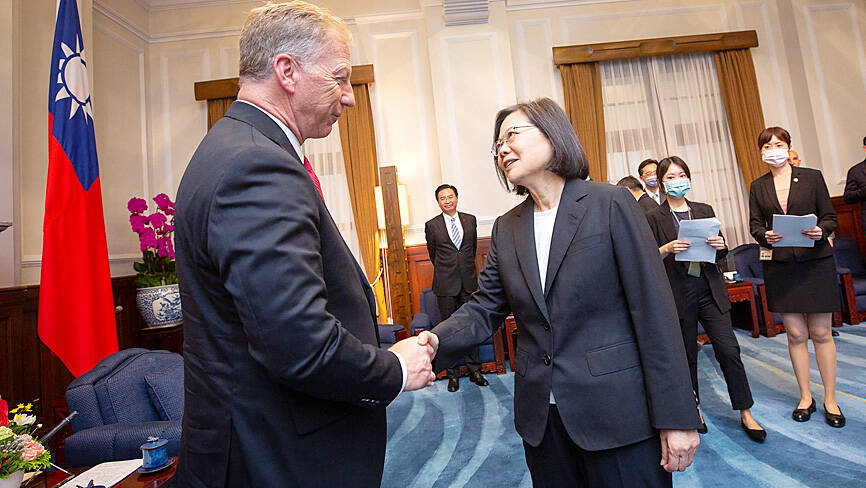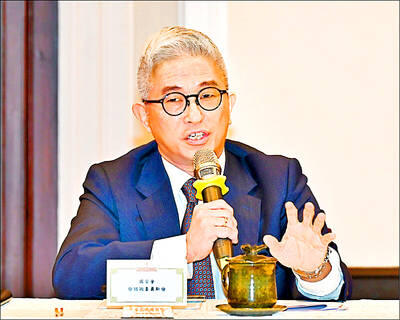Visiting US Representative Kevin Hern during a meeting with President Tsai Ing-wen (蔡英文) yesterday said he hopes to see Taiwan as an independent country one day.
Hern is leading a delegation of US lawmakers from the US Republican Study Committee (RSC), of which he is the chairman.
The group is to stay until tomorrow.

Photo: Reuters
“Support for Taiwan as an independent and sovereign nation has been one of the founding principles of the RSC and has remained a top priority for 50 years,” he said.
As the US celebrated its Independence Day yesterday, Hern said: “What an honor it would be to one day soon see Taiwan experience the same independence that our original 13 colonies enjoyed in the early days.”
He thanked Taiwanese for “wanting the liberties and freedoms that can only be truly experienced as an independent nation.”
He acknowledged the leadership of Representative to the US Hsiao Bi-khim (蕭美琴), saying the Taipei Economic and Cultural Representative Office in the US “is truly an amazing example of the hard work and commitment that is synonymous with the culture of Taiwan.”
The relationship between Taiwan and the US enjoys support across the political spectrum, and “all Americans of all walks of life understand the importance of our friendship,” Hern said.
Tsai thanked Hern for arranging the visit and promoting exchanges between Taiwan and the US.
Taiwan plays a vital role in the global supply chain and hopes to work with the US and other democratic partners to make it safer and more resilient, she said.
Tsai expressed the hope that Taiwan and the US would soon sign an agreement on the avoidance of double taxation, following the signing of the first agreement under the US-Taiwan Initiative on 21st-Century Trade last month.
Earlier yesterday, the delegation met with Vice President William Lai (賴清德), who thanked delegation members for showing support for Taiwan through the visit.
Lai said he hoped that the committee can support Taiwan’s bid to join the Comprehensive and Progressive Agreement for Trans-Pacific Partnership, which would be beneficial to the economic development of Taiwan and the whole region.
Taiwan has been bolstering its national defense capabilities and hopes that the US would continue to provide the nation with the weapons necessary for the nation to defend itself, he said, adding that he also hopes the weapons would be delivered on time.
Separately, eight Canadian lawmakers arrived in Taiwan yesterday for a six-day visit, the Ministry of Foreign Affairs said in a statement.
The members of the delegation, which is led by Deputy Leader of the Canadian Conservative Party Melissa Lantsman, belong to major political parties and serve in important parliamentary committees, the ministry said.
As China continues to take unilateral actions to escalate regional tensions, the visit “fully demonstrates the Canadian parliament’s firm support for Taiwan,” it said.
Through the trip, the delegation would gain a better understanding of the situation in Taiwan and in the region, which can help improve the partnership between Taiwan and the Canadian parliament, it added.

A car bomb killed a senior Russian general in southern Moscow yesterday morning, the latest high-profile army figure to be blown up in a blast that came just hours after Russian and Ukrainian delegates held separate talks in Miami on a plan to end the war. Kyiv has not commented on the incident, but Russian investigators said they were probing whether the blast was “linked” to “Ukrainian special forces.” The attack was similar to other assassinations of generals and pro-war figures that have either been claimed, or are widely believed to have been orchestrated, by Ukraine. Russian Lieutenant General Fanil Sarvarov, 56, head

SAFETY FIRST: Double the number of police were deployed at the Taipei Marathon, while other cities released plans to bolster public event safety Authorities across Taiwan have stepped up security measures ahead of Christmas and New Year events, following a knife and smoke bomb attack in Taipei on Friday that left four people dead and 11 injured. In a bid to prevent potential copycat incidents, police deployments have been expanded for large gatherings, transport hubs, and other crowded public spaces, according to official statements from police and city authorities. Taipei Mayor Chiang Wan-an (蔣萬安) said the city has “comprehensively raised security readiness” in crowded areas, increased police deployments with armed officers, and intensified patrols during weekends and nighttime hours. For large-scale events, security checkpoints and explosives

‘POLITICAL GAME’: DPP lawmakers said the motion would not meet the legislative threshold needed, and accused the KMT and the TPP of trivializing the Constitution The Legislative Yuan yesterday approved a motion to initiate impeachment proceedings against President William Lai (賴清德), saying he had undermined Taiwan’s constitutional order and democracy. The motion was approved 61-50 by lawmakers from the main opposition Chinese Nationalist Party (KMT) and the smaller Taiwan People’s Party (TPP), who together hold a legislative majority. Under the motion, a roll call vote for impeachment would be held on May 19 next year, after various hearings are held and Lai is given the chance to defend himself. The move came after Lai on Monday last week did not promulgate an amendment passed by the legislature that

PENTAGON ASSESSMENT: A US report said that even as China and Russia deepen their partnership, cooperation is hindered by a ‘mutual distrust’ of each other The Chinese People’s Liberation Army (PLA) as of October had doubled the number of ships and airplanes deployed around Taiwan compared with the previous two years, Vice Minister of National Defense Hsu Szu-chien (徐斯儉) said yesterday, a day after the opposition-controlled legislature voted against reviewing the government’s general budget for next year, including a NT$1.25 trillion (US$39.71 billion) special defense spending bill. The legislature’s vote against the Ministry of National Defense’s spending plans was regrettable, as the budget was designed to respond to the developing Chinese military threat, Hsu said on the sidelines of a legislative meeting on the general budget. Defense